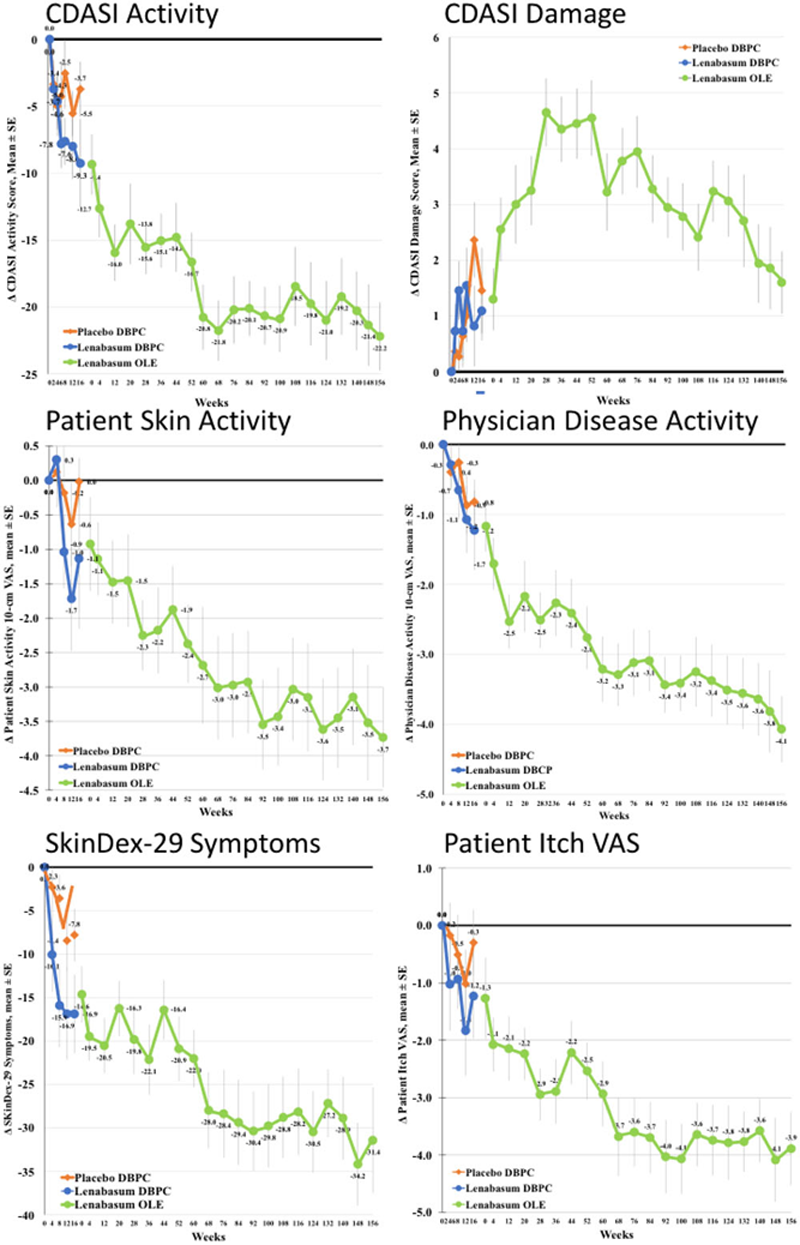

Background: Lenabasum is a synthetic, non-immunosuppressive, selective cannabinoid receptor type 2 agonist that activates resolution of inflammation. Lenabasum had acceptable safety and tolerability and improved efficacy outcomes in the initial 16-week double-blinded, randomized, placebo-controlled Part A of Phase 2 trial JBT101-DM-001 (NCT02466243) in DM subjects with refractory skin involvement. In that study, lenabasum or placebo was added to stable background treatment, with immunosuppressive therapies allowed.
Objectives: To assess long-term safety and efficacy in DM subjects in this study.
Methods: Subjects who completed Part A of the Phase 2 study (n = 22) were eligible to receive oral lenabasum 20 mg BID in an open-label extension (OLE) that assessed safety and efficacy at 4 weeks, then every 8 weeks.
Results: 20/22 (91%) eligible subjects enrolled in the OLE, following a mean interval of 31 weeks from the end of Part A, during which they continued to receive standard-of care treatments, to the start of the OLE during which lenabasum 20 mg BID was added. 17/20 (85%) subjects were on stable baseline immunosuppressive drugs. At the time of this data cut-off, 17 subjects were still enrolled, 17 had completed 140 months (2.7 years), and 15 had completed 156 months (3 years) of OLE dosing.
All OLE subjects experienced at least 1 adverse event (AE), with 118 AEs during the OLE through Dec 2020. Most AEs were mild (n = 111, 94%), with 2 severe AEs (fatigue and metastatic prostate cancer) considered unrelated to lenabasum. AEs occurring in ≥ 3/20 OLE subjects were: URI (n = 5); fatigue (n = 4); nausea (n = 3); common cold (n = 3); UTI (n = 3); and DM flare (n = 3). No serious AEs related to lenabasum have been reported in this OLE to date. No subject discontinued the OLE because of an AE related to lenabasum.
Improvement was seen in multiple physician- and patient-reported efficacy outcomes. CDASI activity score improved through the first 15 months of lenabasum treatment in the OLE and remained stable thereafter, with an improvement of ~20 points from the beginning of the study maintained from Month 15 through Year 3 in the OLE. CDASI damage score increased through the first year of the OLE, even though skin activity was decreasing, but lessened thereafter, returning after 3 years to about the same level it was at the beginning of the OLE. Other outcomes shown in
Conclusion: Lenabasum continues to have a favorable safety and tolerability profile in the OLE of the Phase 2 trial JBT101-DM-001 with no serious AEs or study discontinuations related to lenabasum. The CDASI activity score and multiple other physician and patient-reported outcomes improved and have remained stable, showing durability of improvement in these patients with refractory skin disease. Skin damage was reversible and began to improve once skin activity stabilized. The limitations of attributing this improvement to lenabasum in the setting of open-label dosing is acknowledged. These data support further testing of lenabasum for the treatment of DM, and a Phase 3 study of lenabasum in DM is ongoing.
Change from Baseline in Selected Efficacy Outcomes in OLE of Phase 2 Trial JBT101-DM-001

Disclosure of Interests: Victoria Werth Grant/research support from: Investigator for Corbus Pharmaceuticals and received funding to conduct trials, Josef Concha: None declared, Julie Burroughs: None declared, Joyce Okawa: None declared, Rui Feng: None declared, Anisha Jobanputra: None declared, Robert Borucki: None declared, Kathleen Hally Employee of: Employee of Corbus Pharmaceuticals, Emily Hejazi: None declared, Michael Tillinger Employee of: Employee of Corbus Pharmaceuticals, Scott Constantine Employee of: Employee of Corbus Pharmaceuticals, Nancy Dgetluck Employee of: Employee of Corbus Pharmaceuticals, Barbara White Employee of: Employee and stockholder of Corbus Pharmaceuticals